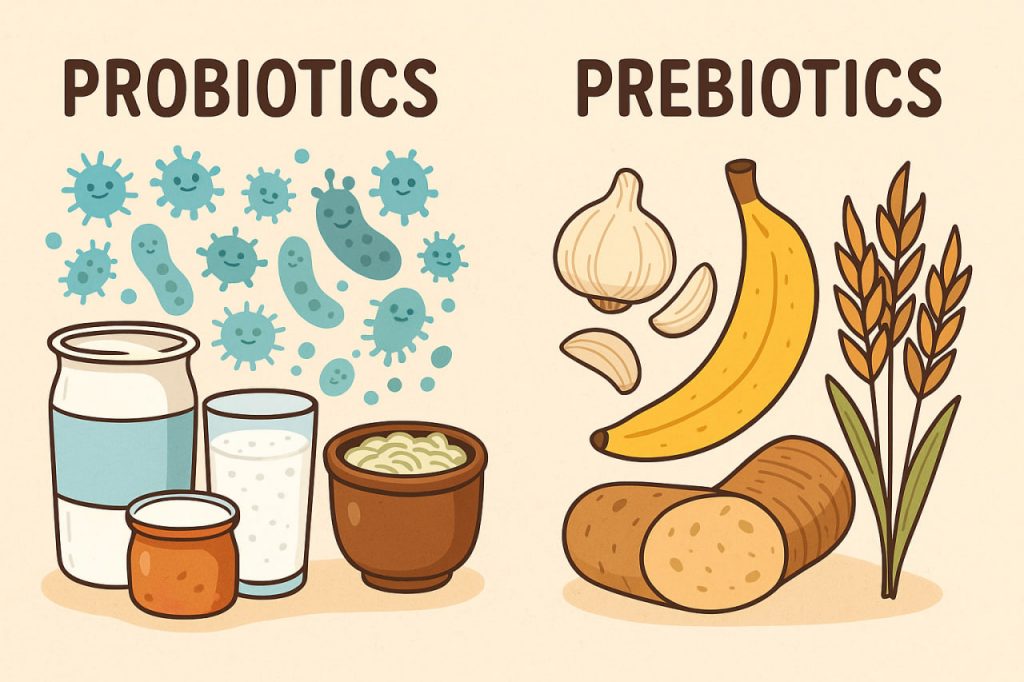Our digestive system is home to trillions of microorganisms, many of which play a vital role in maintaining health. Among the most important helpers for gut balance are probiotics and prebiotics. Though their names sound similar, they serve different but complementary functions. Together, they support digestion, immunity, and overall well-being.
What Are Probiotics?
Probiotics are live microorganisms—mainly beneficial bacteria—that help maintain a healthy gut environment. They naturally occur in foods like yogurt, kefir, sauerkraut, and kimchi. Probiotics work by balancing the gut microbiota, preventing harmful bacteria from dominating, and supporting digestion. Research shows that they may reduce the risk of diarrhea, help ease symptoms of irritable bowel syndrome (IBS), and support the immune system. However, the effects vary depending on the strain and the individual’s health condition.
What Are Prebiotics?
Prebiotics are not bacteria themselves but rather the “food” that beneficial bacteria need to thrive. They are types of dietary fiber found in foods such as garlic, onions, bananas, asparagus, and whole grains. Prebiotics pass through the digestive system undigested until they reach the colon, where they are fermented by gut bacteria. This fermentation process produces compounds that nourish the gut lining and support metabolic health.
How Probiotics and Prebiotics Work Together
Probiotics and prebiotics complement each other in what is known as a synbiotic relationship. Probiotics introduce or maintain healthy bacteria in the gut, while prebiotics feed those bacteria, helping them grow and function effectively. For example, eating yogurt (probiotics) along with fiber-rich fruit like bananas (prebiotics) strengthens the beneficial bacteria in your digestive system. This teamwork improves digestion and nutrient absorption.
Health Benefits of Probiotics and Prebiotics
A balanced intake of probiotics and prebiotics can:
- Support a healthy digestive system.
- Reduce harmful bacteria and restore balance after antibiotics.
- Improve nutrient absorption, especially minerals like calcium.
- Strengthen the immune system by regulating gut flora.
- Contribute to better metabolism and possibly support weight management.
While these benefits are supported by scientific studies, it is important to remember that self-medication with supplements is not recommended—consulting a specialist is the safest approach.
Sources in Everyday Diet
- Probiotics: yogurt, kefir, sauerkraut, kimchi, miso, kombucha.
- Prebiotics: garlic, onions, leeks, asparagus, bananas, whole grains, legumes.
Including a variety of these foods in the diet is often the most natural and effective way to support gut health.
Conclusion
Probiotics are beneficial microorganisms, while prebiotics are the fibers that feed them. Together, they form a powerful system that maintains gut health, boosts immunity, and supports overall well-being. A diet rich in both can help create a balanced digestive environment, essential for long-term health.
Glossary
- Probiotics – live beneficial microorganisms that support gut health.
- Prebiotics – non-digestible fibers that nourish beneficial bacteria in the gut.
- Microbiota – the community of microorganisms living in the human digestive tract.
- Fermentation – the process by which bacteria break down fibers, producing beneficial compounds.
- Synbiotic – the combined use of probiotics and prebiotics for maximum health benefits.


